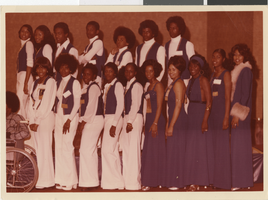Search the Special Collections and Archives Portal
Search Results
Daryl Privott oral history interview
Identifier
Abstract
Oral history interview with Daryl Privott conducted by Claytee D. White on March 16, 2021 for African Americans in Las Vegas: a Collaborative Oral History Project.
Daryl Privott was previously the University of Nevada, Las Vegas Libraries' Facilities Manager during the move from Dickerson Library into Lied Library. It was during this time that he pursued advanced education, earning his PhD from UNLV before moving to Lexington, Kentucky. Privott discusses his professional and family life as well as his personal philosophies.
Archival Collection
Dianna and Gerald Davis oral history interview
Identifier
Abstract
Oral history interview with Dianna and Gerald Davis conducted by Claytee D. White on May 6, 2021 for African Americans in Las Vegas: a Collaborative Oral History Project.
Gerald Davis was falsely arrested on a Sunday afternoon in October 1969, leading to a three-day riot in the Black Westside community of Las Vegas. The Davis' discuss this event as well as their respective backgrounds and past experiences living in Las Vegas, including the businesses they supported, the places they visited, and their employment history.
Subjects discussed include: 1969 riot; Jackson Ave; Officer Arrington; Westside School; and Charles Wyatt
Archival Collection
Pamela Goynes-Brown oral history interview
Identifier
Abstract
Oral history interview with Pamela Goynes-Brown conducted by Kane Toomer on November 26, 2014 for the African Americans in Las Vegas: a Collaborative Oral History Project. In this interview, Goynes-Brown discusses her upbringing and describes her life in Las Vegas, Nevada. She talks about her education, being involved in music, and explains why her parents decided to move to Las Vegas. Goynes-Brown recalls experiencing racism in school, her employment at Mabel Hoggard Elementary School as a music teacher, and working in the Clark County School District. Later, Goynes-Brown talks about African American community leaders in Las Vegas and serving on the City Council of North Las Vegas. Lastly, Goynes-Brown talks about the importance of voting, especially the African American community, and the development of the West Las Vegas.
Archival Collection
Richard Steele and Zakeisha Steele-Jones oral history interview
Identifier
Abstract
Oral history interview with Richard Steele and Zakeisha Steele-Jones conducted by Claytee D. White on February 12, 2015 for the African Americans in Las Vegas: a Collaborative Oral History Project. In this interview, Richard Steel discusses his life in the Marine Corps, his life as a boxer, moving to Las Vegas, Nevada, and working as a referee for boxing. Zakeisha Steele-Jones discusses how her father was an actor and campus police officer. Richard Steele then describes his most memorable fights that he refereed.
Archival Collection

Transcript of interview with Nathaniel Whaley by John Grygo, March 6, 2013
Date
Archival Collection
Description
Interview with Nathaniel Whaley by John Grygo on March 6 and March 8, 2013. Whaley talks about growing up in Las Vegas and his adult life on the Westside. Nathaniel had a successful high school career as an accomplished athlete and Eagle Scout in the first black Boy Scout troop in the area. Nathaniel would go on to have a fruitful career as a mason and contractor, literally helping build the city of Las Vegas.
Text

Photograph of a group at an NAACP event including Eleanor Walker, no date
Date
Archival Collection
Description
Black and white photograph of a group of women, including former NAACP President Eleanor Walker (third from left).
Image

Photograph of a group of men and women at an NAACP event, no date
Date
Archival Collection
Description
Color photograph of a group of men and women at an event for the NAACP. Katherine Joseph is attributed with having made the clothing for this NAACP event.
Image
Audio clip from interview with Jocelyn Oats conducted by John Grygo and Claytee D. White, November 20, 2012
Date
Archival Collection
Description
Audio clip from interview with Jocelyn Oats on November 20, 2012. In the clip, Jocelyn talks about the beginnings of Nevada Partners, and her work with the teenaged youth of Las Vegas in the 1990s.
Sound
Lovey McCurdy oral history interview
Identifier
Abstract
Oral history interview with Lovey McCurdy conducted by Greg McCurdy on March 19, 1981 for the Ralph Roske Oral History Project on Early Las Vegas. Lovey recalls arriving in Las Vegas, Nevada in 1951, meeting white people in Las Vegas, Nevada, the atomic bomb testing, and other aspects of being part of the African American community during the 1950s and 1960s.
Archival Collection
Jean S. Childs oral history interview
Identifier
Abstract
Oral history interview with Jean Childs conducted by Claytee White on December 02, 2013 for the African Americans in Las Vegas: a Collaborative Oral History Project. Jean recalls the culture shock of segregation and racism her family encountered upon arriving in Las Vegas, Nevada from California in 1963. Jean spoke about how her mother was a role model for her, who carved a path of fighting for the underprivileged, growing the Head Start program in Las Vegas.
Archival Collection
